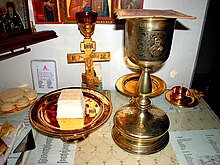
Azymite (from Ancient Greek ázymos, unleavened bread) is a term of reproach used by the Eastern Orthodox Church since the eleventh century against the Latin Church, who, together with the Armenians and the Maronites, celebrate the Eucharist with unleavened bread. Some Latin controversialists have responded by assailing the Greeks as "Fermentarians" and "Prozymites".
The canon law of the Latin Church of the Catholic Church mandates the use of unleavened bread for the Host, and unleavened wafers for the communion of the faithful. On the other hand, most Eastern churches explicitly forbid the use of unleavened bread (Greek: azymos artos) for the Eucharist. Eastern Christians associate unleavened bread with the Old Testament and allow only for bread with yeast, as a symbol of the resurrection of Christ (since yeast is the agent that gives rise to bread). Indeed, this usage figures as one of the three points of contention that traditionally accounted as causes (along with the issues of Petrine supremacy and the filioque in the Niceno-Constantinopolitan Creed) of the Great Schism of 1054 between Eastern and Western churches.[1]
- ^ Ware, Timothy (1964), The Orthodox Church, London: Penguin Books, p. 66, ISBN 0-14-020592-6